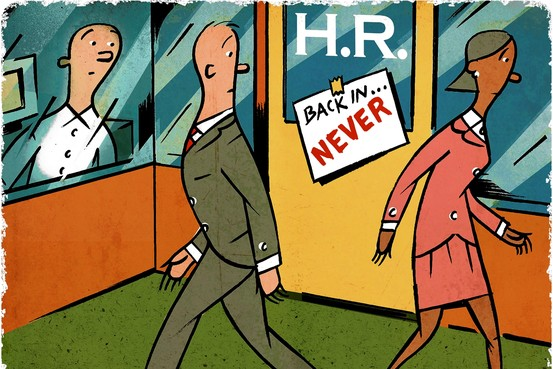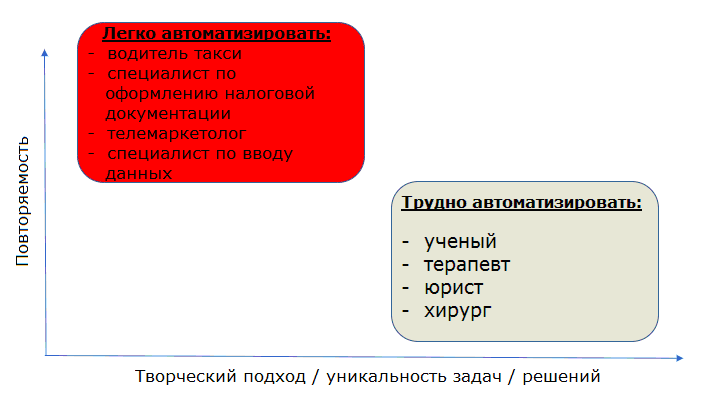4 secrets how not to lose work in data science
Translator Elena Bornovolokova specifically for Netology adapted an article by the American analyst Tavish Shrivastava on how the automation process affects the data scientist.
Automation affects professional activities in all industries. On the one hand, automation helps to manage the business more efficiently, and on the other hand, it leads to a constant change in the set of necessary skills.
Failure to meet the required skill sets leads to a loss of job. I will illustrate this thought with two scenarios.

You got a job as a recruiter in 2000, when most company documents were paper. You effectively sorted documents, found them on demand, and thanks to these skills you have become the best specialist.
')
Given that the processes of recruitment and personnel management have not changed much over time, for 18 years you have not taken care of acquiring computer skills. However, from 2000 to 2018, there were significant changes in work methods, and now all employee records are stored on a cloud or private server.
As a result, your skills were not so in demand. If you do not begin to improve their skills, you will encounter difficulties when looking for a job. Please note that the mismatch of your skills did not occur due to the development of recruitment processes and personnel management, but because of the changing business processes that you support.

You worked as a speaker and read the news on the radio when there was no television. You were a good employee, aware of current events. But after television became widespread, radio lost its popularity. The employer cut you because the radio was losing money.
Considering the skills, you will try to get a job as a television news host, but you need to work on body language and overcome the fear of the camera. Is there any good news? Yes. In your environment there are people who work in television, and from them you learned what you can count on, and are actively working on it.
Please note that in this case, neither your profession nor your industry has changed. It’s just that customers have begun to give preference to an alternative product or service in the business that you support, which makes your skills inappropriate or outdated for this industry.
The changes simplify business management, but at the same time create discrepancies in the skills required for work, which leads to unemployment in certain industries.
The following are the three main reasons for changes in industry skills:
Automation and changing business sectors reduce jobs, but will some professions be more affected by automation than others?
Despite the fact that no one knows which professions automation will affect to a greater or lesser extent, below is a structure that will help to understand the idea as a whole.
Machines are poorly trained when there are few examples, and they do not know how to be creative in their work. If your work has these two characteristics, then you have nothing to fear. For example, driving a car is an iterative process that does not require creativity. Therefore, taxi drivers are at high risk of automating their work.

Specialists in data processing and analysis perform various tasks, helping businesses grow. Each of these tasks is in different places on this chart. The figure below reflects my thoughts on the various subtasks that data scientists perform. The ratio may vary depending on the specific roles.

Not all components of the data scientist work have a 10-year warranty. Getting into robotization depends on the amount of work that is difficult to automate, and your specific role.
The main skills of a specialist in data processing and analysis in 2010 were knowledge of logistic and linear regression and knowledge of SAS base and MS Excel. If we transfer this specialist to 2018 without improvements in the technique and skills of working with new tools, he will encounter difficulties in finding a job in his specialty. Although data science will exist for a long time, the roles and responsibilities of specialists will change. Specialists who cannot assimilate them will face serious problems in career advancement.
Young people who come to the field of data science have the necessary skills, so in the short term there is no problem of professional inconsistency. But with the development of the sphere, the age of specialists will increase, and the technology will change, so you need to improve skills in the course of performing daily tasks.
I recommend four points to data processing and analysis specialists to protect their professional future:
Courses "Netology" on the topic:
Introduction
Automation affects professional activities in all industries. On the one hand, automation helps to manage the business more efficiently, and on the other hand, it leads to a constant change in the set of necessary skills.
Failure to meet the required skill sets leads to a loss of job. I will illustrate this thought with two scenarios.
Scenario 1 - Manual Labor

You got a job as a recruiter in 2000, when most company documents were paper. You effectively sorted documents, found them on demand, and thanks to these skills you have become the best specialist.
')
Given that the processes of recruitment and personnel management have not changed much over time, for 18 years you have not taken care of acquiring computer skills. However, from 2000 to 2018, there were significant changes in work methods, and now all employee records are stored on a cloud or private server.
As a result, your skills were not so in demand. If you do not begin to improve their skills, you will encounter difficulties when looking for a job. Please note that the mismatch of your skills did not occur due to the development of recruitment processes and personnel management, but because of the changing business processes that you support.
Scenario 2 - Customer Preferences

You worked as a speaker and read the news on the radio when there was no television. You were a good employee, aware of current events. But after television became widespread, radio lost its popularity. The employer cut you because the radio was losing money.
Considering the skills, you will try to get a job as a television news host, but you need to work on body language and overcome the fear of the camera. Is there any good news? Yes. In your environment there are people who work in television, and from them you learned what you can count on, and are actively working on it.
Please note that in this case, neither your profession nor your industry has changed. It’s just that customers have begun to give preference to an alternative product or service in the business that you support, which makes your skills inappropriate or outdated for this industry.
What have we learned from these scenarios?
The changes simplify business management, but at the same time create discrepancies in the skills required for work, which leads to unemployment in certain industries.
The following are the three main reasons for changes in industry skills:
- Changes in the tools and technologies that are used in your profession;
- Changes in the way you do business.
- Changes in customer preferences regarding a product or service that you produce or promote.
Automation and changing business sectors reduce jobs, but will some professions be more affected by automation than others?
Despite the fact that no one knows which professions automation will affect to a greater or lesser extent, below is a structure that will help to understand the idea as a whole.
Machines are poorly trained when there are few examples, and they do not know how to be creative in their work. If your work has these two characteristics, then you have nothing to fear. For example, driving a car is an iterative process that does not require creativity. Therefore, taxi drivers are at high risk of automating their work.

Are the data scientist protected from robotization?
Specialists in data processing and analysis perform various tasks, helping businesses grow. Each of these tasks is in different places on this chart. The figure below reflects my thoughts on the various subtasks that data scientists perform. The ratio may vary depending on the specific roles.

Not all components of the data scientist work have a 10-year warranty. Getting into robotization depends on the amount of work that is difficult to automate, and your specific role.
The main skills of a specialist in data processing and analysis in 2010 were knowledge of logistic and linear regression and knowledge of SAS base and MS Excel. If we transfer this specialist to 2018 without improvements in the technique and skills of working with new tools, he will encounter difficulties in finding a job in his specialty. Although data science will exist for a long time, the roles and responsibilities of specialists will change. Specialists who cannot assimilate them will face serious problems in career advancement.
Young people who come to the field of data science have the necessary skills, so in the short term there is no problem of professional inconsistency. But with the development of the sphere, the age of specialists will increase, and the technology will change, so you need to improve skills in the course of performing daily tasks.
How to stay productive and in demand in data science in the long term?
I recommend four points to data processing and analysis specialists to protect their professional future:
- Learn the latest and best tools and technologies.
- Analyze industry changes and their impact on your work.
- Always think about the added value that your work for business creates.
- Be aware of what is happening in other industries that go beyond yours.
From the Editor
Courses "Netology" on the topic:
- online profession " Data Analyst "
- online profession " Data Scientist "
Source: https://habr.com/ru/post/434202/
All Articles